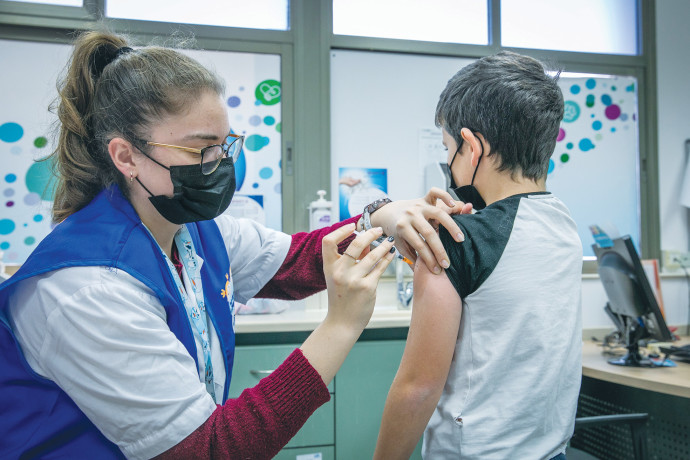Did the Israeli government’s decision last December to allow a fourth dose of Pfizer’s COVID-19 vaccine for all those ages 60 years and over save lives or was it ineffective?
A team of researchers has concluded that it in fact saved many lives and reduced the need for hospitalization.
Hows was the study conducted?
Researchers from the epidemiology and preventive department at Tel Aviv University’s Sackler Faculty of Medicine, Soroka University Medical Center in Beersheba, Ben-Gurion University of the Negev’s Faculty of Health Sciences and the Health Ministry’s geriatric department and Senior Shield Project studied the medical records of 24,088 elderly recipients living in long-term-care geriatric facilities who received a fourth dose, and those of 19,687 who received only three doses four months previously or earlier.
They found that getting the fourth shot was associated with 34% protection against infection, 64% to 67% against acute hospitalizations for mild-to-moderate and severe illness, and 72% against deaths.
Thus, the fourth shot definitely saved lives and reduced the need for acute hospitalization. However, protection against infection with the Omicron variant was only “modest,” they wrote.
The data covered 43,775 residents, almost 68% of them women, whose mean age was 80.1 years. The median follow-up time was 73 days. More than seven days after being vaccinated with the fourth dose, SARS-CoV-2 infection was detected among 4,058 fourth-dose vs. 4,370 third-dose recipients.

Why are these findings important?
These findings, they asserted, are relevant to the control of the COVID-19 pandemic not only in Israel but around the world, especially among elderly people living in long-term-care geriatric institutions.
Israel was the first country to introduce a third vaccine dose five months or more after the second one. That program was associated with high protection against overall SARS-CoV-2 infection, COVID-19 hospitalizations and deaths in the general population.
“Elderly residents of long-term-care facilities are at high risk for severe and fatal COVID-19, with reduced immunity... and rapid decline in the immune response after two vaccine doses,” the team wrote.
“Elderly residents of long-term-care facilities are at high risk for severe and fatal COVID-19, with reduced immunity … and rapid decline in the immune response after two vaccine doses.”
Research team
Israel's actions
To protect this population, the Israeli government launched a designated task force, Senior Shield, which was responsible for preventing and controlling COVID-19 in geriatric facilities, including providing personal protective equipment, screening and early detection of healthcare workers and vaccinating residents.
The vaccination campaign for the third dose in geriatric patients began in August 2021 and was associated with high vaccine uptake and rapid declines in the incidence of SARS-CoV-2 infection and COVID-19 hospitalizations. Protection by this third dose – compared with the second dose given five or more months earlier – was 89% against infection, 92% to 93% against COVID-19 hospitalization and 96% against COVID-19 deaths during the Delta variant surge.
The Omicron variant, first identified in Israel last November, became the dominant variant just two months later. By the beginning of December 2021, a marked rise in COVID-19 infections was observed, which was also found among fully vaccinated people.
Rise of COVID-19
To contain this substantial surge, the Health Ministry approved giving the fourth dose on the last day of 2021; it was initially meant for those in long-term-care geriatric facilities and later expanded to the general population 60 years or older.
Indeed, among the general Israeli population 60 years or older, wrote the team, the protection granted by the fourth dose was estimated at 45% to 50% against SARS-CoV-2 infection. It was 62% to 71% effective against severe COVID-19 during the period of one to four weeks after vaccination compared with vaccination with three doses four months or more earlier.
